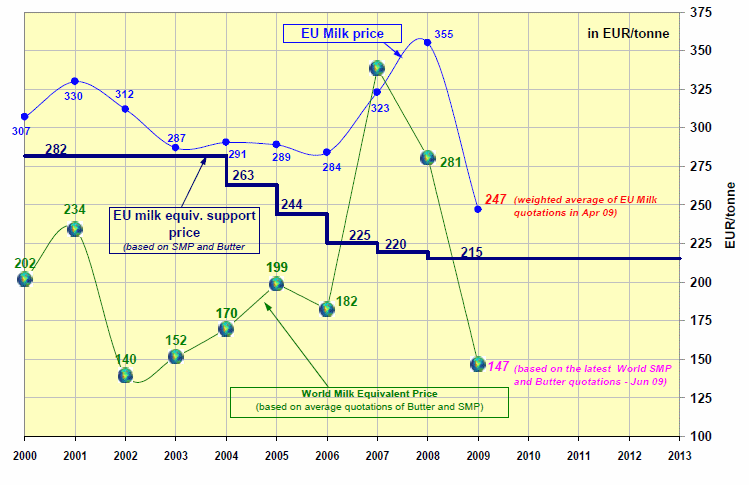Last night, BBC2 screened the first of six hour-long episodes in a new documentary series, The Future of Food.
 … Read the rest
… Read the rest
Big Phil Lays It On The Line
Vaasa, Finland: Philip Lowe is a leading figure in the rural studies community in the UK and he issues a stark warning about the so-called ‘new productivism’ in an interview that was issued to delegates at the ESRS Congress where he gave the opening plenary.… Read the rest
UK House of Lords reviews 2010 EU draft budget
In a recent report, the UK House of Lords European Committee criticised the European Commission’s proposals for the 2010 European Communities budget for maintaining a very high level of spending on agriculture, and failing to shift adequate resources to stimulus measures to aid economic recovery. It expressed frustration that, in the middle of an economic crisis, the proportion of the budget going to agriculture remained so large.
It identified a particular problem for the funding of the second tranche of the European Economic Recovery Programme. This was the stimulus package of €5 billion agreed in March 2009, of which €2.6 billion was to be funded from the 2009 budget and €2.4 billion from the 2010 budget.… Read the rest
Addressing the dairy crisis – is US intervention buying a good thing for EU producers?
Today, the US raised its intervention support prices for some dairy products as a way of supporting the US farm price for milk. The support price for skimmed milk powder was increased by 15 percent and for cheddar cheese by 16 per cent for a limited 3-month period. Immediately milk prices on the Chicago Mercentile Exchange increased by 5 per cent, and it is estimated that the measure will add $243 million to US dairy farm incomes in the current year.
From a European perspective, this measure has ambiguous effects and may even be welcomed for its short-run effects. In the short run, the Commodity Credit Corporation will enter the market as an additional buyer, raising the floor price of milk.… Read the rest
Where to find data on EU export refunds?
Recently, I was looking for an internet source for EU export refunds – not overall expenditure, but the refund rates for individual commodities by month. What I was hoping to find was an Excel worksheet which set out this information, but it seems extraordinarily hard to come by. The nearest I could get was the excellent webpage on export refunds for milk and meat products maintained by OFIVAL, the French marketing agency. However, the data here take the form of pdf files containing the information every time the refund levels are changed, and it would be extremely tedious to transfer this into an Excel file.… Read the rest
Latest WTO agriculture update
Pascal Lamy, the WTO Director-General, provided an end-of-term report on the status of the Doha Round trade negotiations at the July meeting of the Trade Negotiations Committee before delegates left for their August break. This is what he had to say about the agricultural negotiations.
… Read the restAs you know, work in agriculture is continuing, particularly in light of the renewed political mandate from the G20 and G8. The Revision 4 bracketed and annotated areas needing further work have been identified. These include SSM [Special Safeguard Mechanism] (especially the architecture), cotton, issues related to sensitive products, preference erosion and tropical products, TRQ [Tariff Rate Quota] expansion as well as tariff simplification.
Does farm size influence environmental outcomes?
A widely-accepted justification for subsidising agriculture is that we need to prevent the emergence of the industrialised, mono-cultural agriculture which is the inevitable result of an efficiency-based, cost-oriented farming model by protecting the diversified, environmentally-friendly small farmer in order to maintain the positive environmental benefits of European agriculture. This is part of the philosophy of agrarianism which underpins much discussion of agricultural policy.
Let us leave aside for the moment the fact that the bulk of existing farm subsidies go to larger farmers rather than smaller ones, so that even if the thesis above is valid, current agricultural policy does not support it.… Read the rest
The Commission milk market report
The Commission today produced its report on the dairy market requested by the European Council in June, and Commissioner Fisher Boel has underlined its main findings in her blog. The background to the current market crisis is shown clearly in the graph reproduced from the Commission report.
Friday fun quiz: What is a public good?
Anyone who has followed the CAP debate this past few years will have observed how the term ‘public good’ has been adopted by almost everyone seeking to advance their own vision of the CAP, from the dinosaurs of COPA-COGECA, to the more moderate National Farmers Union to the José Bové’s Via Campesina, organic farmers like the Soil Association, food policy wonks like Sustain and the Food Ethics Council, and of course the various environmental groups from where the public goods idea orignally hailed.… Read the rest
Franco-German combine to set future path of the CAP?
Euractiv reports on the creation of a new Franco-German working group to frame reform of the EU’s Common Agricultural Policy (CAP) after 2013. France has a new Agriculture Minister in Bruno Le Maire, who wasted no time in setting out his stall in meetings with Commission President Jose Manuel Barroso.… Read the rest

 …
…